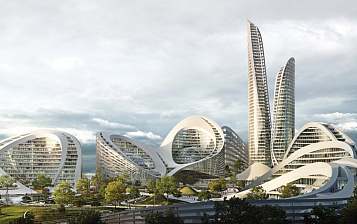Samsung Electronics Co. decided to build a state-of-the-art chip manufacturing facility in Texas, a victory for the Biden administration as it prioritizes supply chain security and increased semiconductor production on American soil.
South Korea's largest company has opted for the city of Taylor, about 30 miles from the existing giant manufacturing center in Austin, a source familiar with the matter said. Samsung and Texas officials will announce a decision soon, according to people familiar with the matter, and will ask not to be named because the news has not been made public. A Samsung spokesperson said a final decision has yet to be made and declined to comment further.
Samsung hopes to attract more US customers and close the gap with Taiwan Semiconductor Manufacturing Co. Her decision, coming months after de facto leader J. Y. Lee was released from prison on parole, follows plans by TSMC and Intel Corp. spend billions on cutting-edge facilities around the world. The industry triumvirate is rushing to meet the post-pandemic surge in demand that has maximized global opportunities, while more and more connected devices from cars to homes are expected to require chips in the future.
The new plant will add to Samsung's already sizable footprint in Austin, where the company has invested about $17 billion to date in a sprawling facility that employs more than 3,000 people and produces some of the most complex chips in the country. Samsung plans to invest another $17 billion and create about 1,800 jobs over the first 10 years, according to documents the company has released to Taylor officials.
Korean Yonhap and the Wall Street Journal have previously written about Taylor's choice.
The Asian giant is taking advantage of US government efforts to counter rising Chinese economic power and lure home some of the cutting-edge manufacturing that has gravitated toward Asia in recent decades. Those ambitions crystallized after a global chip shortage hampered the tech and auto industries, cost companies billions in lost revenue, and forced businesses to lay off workers, leaving the US vulnerable to diversified supply chains. In June, President Joe Biden launched a sweeping effort to secure critical supply chains, including a proposed $52 billion to support domestic chip manufacturing.
His administration has repeatedly called for more U.S. chip production, saying it's the best way to compete with China and mitigate supply chain disruptions like the one caused by Covid 19.
Last month, the US set up an "early warning system." to identify shocks associated with Covid. And he asked semiconductor manufacturers and consumers to fill out a survey on inventory, demand, and delivery systems to identify potential problems.
Lately, Intel's tech-related issues and its potential future dependence on TSMC and Samsung, at least for chip manufacturing, have underlined just how much the Asian giants have moved forward in recent years. The administration talked Intel out of plans to set up a silicon wafer factory in Chengdu, China.
The White House also called on Democrats in the House of Representatives to pass a $52 billion bill known as the Chip Act that would fund the nation's semiconductor research and manufacturing. Administration officials pointed to the bill when they were pressed for security problems in Taiwan, the world's largest chipmaker. Commerce Secretary Gina Raimondo said Congress should pass the legislation "as soon as possible" when asked if the US needed a clearer defense strategy for the island.
Samsung is joining a growing list of companies moving to or expanding their operations in Texas. Last year, electric vehicle maker Tesla Inc. said it would move its headquarters to the state, as did Oracle Corp. and Hewlett Packard Enterprise Co. the state's business-friendly tax policy and is up for re-election next year.
The local government has taken steps to slow down Samsung, including removing 90% of property taxes for a decade and 85% for the next 10 years.
Samsung itself has stepped up investment activity ever since Li was released from jail for corruption. He unveiled a commitment to support South Korea's economy by spending 240 trillion won ($205 billion) and expand recruitment to 40,000 over the next three years.
In Intel's backyard, he will come face to face with TSMC, which is on track to launch production at its $12 billion Arizona chip manufacturing facility by 2024. Samsung is trying to catch up with TSMC in what it calls the chip foundry business for global corporations - especially big news given the growing shortage of semiconductors in recent months.
The proposed Samsung foundry in the US will switch to ultraviolet lithography equipment from ASML Holding NV. The company, which has struggled for years with low-margin advanced chip manufacturing processes, is refining and accelerating its capacity expansion at home. It aims to mass-produce 3nm chips with so-called Gate All Around technology around 2022, using what some see as a game-changing technology that can more precisely control currents flowing through channels, reduce chip areas, and reduce Energy consumption. Rival Intel has pledged to regain its leadership in the industry by 2025.
Source: Bloomberg

 DOWNLOAD
DOWNLOAD LOOK
LOOK
 Top Content of the Month
Top Content of the Month


